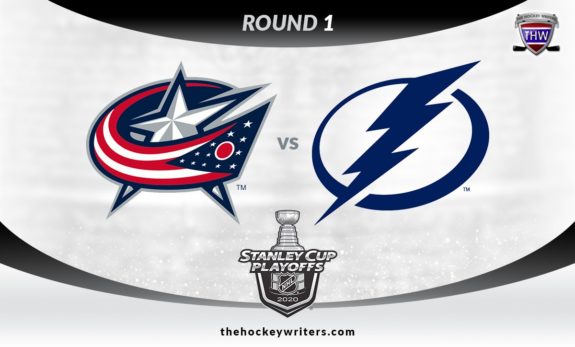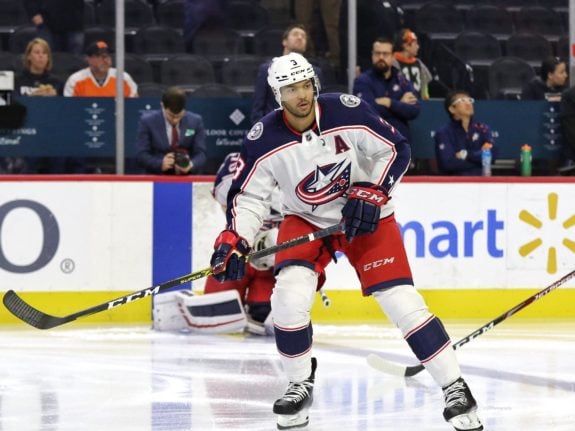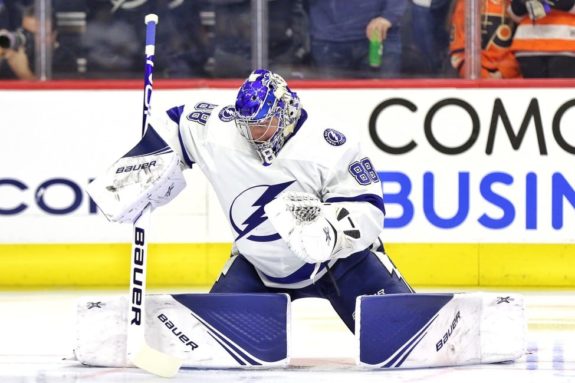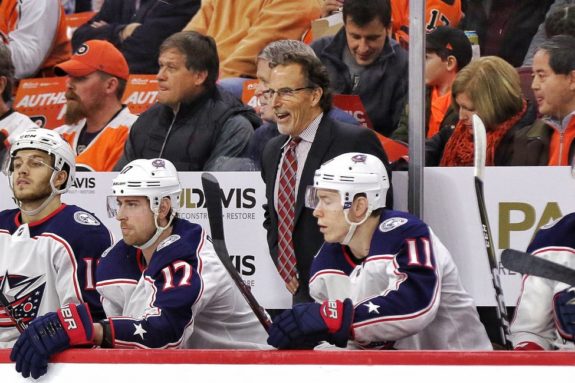It’s the same series as the first round of last year’s playoffs – the Columbus Blue Jackets against the Tampa Bay Lightning. But these are two substantially different teams from those that met last year, when Columbus won all four games. The Blue Jackets lost top stars to free agency, while the Lightning brought in players to make the team tougher to play against. The result was different, too, with the Lightning winning Game 1. Brayden Point scored at 9:33 of the fifth overtime period for a 3-2 victory.

The Lightning roster has seven players who weren’t with the team last playoffs (and a half dozen who are gone now). Among the free agents who walked away from the Blue Jackets: then-starting goalie Sergei Bobrovsky, star winger Artemi Panarin, and center Matt Duchene. (I do want to point out that none of those three made it to the Stanley Cup playoffs this year.)
Related: Blue Jackets/Lightning: 5 Specific Things To Watch For
Game 1 of the best-of-seven series was far grittier than any of last year’s four games. The Lightning at times during the game resembled the New Jersey Devils of the mid-90s, with lots of grabbing and pushing and holding that didn’t result in penalty calls. (The Blue Jackets occasionally matched them grab for grab.) At about the midpoint of the fourth overtime, however, that sandpaper seemed to have been worn smooth. Shoulder-to-shoulder contact behind the nets went from “Hit” to “How do you do?”
By the Numbers
Game 1 (or should we call it “Games” 1?) was the fourth-longest game in the history of the NHL.

The Blue Jackets have now played the equivalent of more than five games (including this game’s overtime periods) in six days, going back to Game 3 of the Qualifying Round series against the Toronto Maple Leafs.
Related: Top 5 Longest NHL Games in the Post-Expansion Era
Seth Jones once again led Columbus in time on ice, clocking 65:06 – more than a full hour –in a single game. That’s obviously a career-high TOI, as well as an NHL record since TOI became a stat in 1997. The previous playoff record for TOI, 63:51, was set by Sergei Zubov on April 24, 2003. Jones’ defense partner Zach Werenski also set a career-high, and also passed the hour mark, with 61:14 TOI.

The official shots on goal show Tampa Bay with a substantial advantage over Columbus, 88-63. However, especially early in the game, the Blue Jackets seemed to be trying to hit the upper corners of the goal behind the Lightning’s Andrei Vasilevskiy. (Shots that sailed just past the bars don’t count as shots on goal because, well, they aren’t actually “on goal.”) Regardless of how many shots were taken, only five of them count – the ones that crossed the goal line.

Columbus goalie Joonas Korpisalo set a team record for the number of saves in a playoff game – or in any game – with 85. The previous club record was 54 saves by Bobrovsky. The actual NHL record for saves in a playoff game is 92 by Normie Smith in 1936, despite what the TV team announced.

Faceoff numbers also officially favored the Lightning 72-66, but watching the action showed that the Blue Jackets perhaps did better in the dot than the scoresheet shows. Of note were Pierre-Luc Dubois (17 of 32) and Boone Jenner (21 of 44). Winning key faceoffs is sometimes better than winning more faceoffs.
Speaking of numbers, Blue Jacket wing Nathan Gerbe is listed as 5-foot-4 and 169 pounds. If he was the size of, say, David Savard (6-foot-2, 227 pounds), a lot of Lightning players would probably still be in ice baths. He threw that little body of his around without reserve, bouncing off opponents seemingly twice his size. He eventually paid the price for his short stature when the elbow of Lightning defenseman Ryan McDonagh (6-foot-1, 216 pounds) collided with Gerbe’s head in the fourth overtime, though he did return later.

Savard showed great restraint early in the game when Lightning forward Yanni Gourde (5-foot-9, 170 pounds) drew blood with a sucker punch. Savard avoided the possibility of a penalty by not retaliating at the time, nor did he target Gourde through the rest of the game. But the series is young.
Shot-blocking was again a hallmark of the Blue Jackets. As usual, Savard topped the team with 11. Other notable shot-blocking efforts included defensive partner Vladislav Gavrikov with nine and forward Boone Jenner with six.

A somewhat deceiving number from the game is the Blue Jackets’ performance on the power play. Yes, they finally scored their first PP goal of the postseason (they were 0-for-14 against Toronto), but to list them as 1-for-5 in this game doesn’t tell a fair story. The second and third power plays were quite abbreviated (0:28 and 0:18 rather than the full 2:00) due to penalties taken while on the PP.
Coming Up Next
It will seem like just a few hours for the players, but Game 2 of this playoff series is scheduled for Thursday, again at 3:00 PM EST, and will, I’m sure the teams hope, end after three periods. Game 1 went so long that the following game (Carolina Hurricanes vs. Boston Bruins) had to be rescheduled for the next morning. It would normally be hard to ask Korpisalo to start the next game, but with Elvis Merzlikins listed as unable to play, Columbus coach John Tortorella is almost assuredly going to name Korpisalo as the starter (from ‘Blue Jackets’ Elvis Merzlikins unable to play in Game 5 vs. Maple Leafs,’ Columbus Dispatch, 08/09/2020).

It will be interesting to see how the players’ legs hold up toward the end of Game 2. I fully expect both teams to come out skating full speed in the first period. But how long can they keep that up after playing seven-plus periods of hockey less than 42 hours prior? And how will that carry over to the remainder of the series?